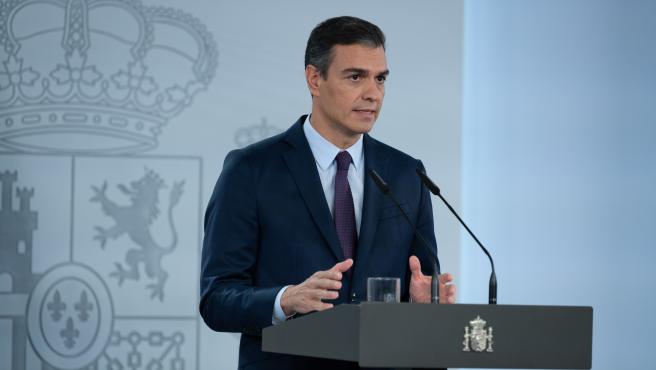STATE OF ALARM RETURNS TO SPAIN
Prime Minister Pedro Sanchez has approved a new state of alarm for the whole of Spain which could be extended until May next year.

Spain will be returning to a limited “State of Alarm” to try and halt the accelerating spread of the coronavirus across the country after an extraordinary meeting of the Council of Ministers was held this morning (Sunday). The new measure will impose a night-time curfew across the nation. And it is likely to last for six months until next May.
Prime Minister Pedro Sanchez has assured citizens that it will not be the same as before when the whole country was confined to their homes for three months. This time the measure will be adopted to cover the night-time curfew which most autonomous regions support to slow down the ‘second wave’ and reach Christmas in a more controlled situation.
Central Government has no intention of returning to the full confinement of March which virtually paralyzed the country economically. But the Government supports the autonomous governments in their belief that it is nocturnal activities which are fueling the second wave of infections and that a night-time curfew is the only reasonable option to reduce the spread.
The issue is that closing bars and restaurants at a specific time is not enough because many people, particularly but not exclusively young adults, head for parties in private houses until the late hours. Prolonged social contact in enclosed and poorly ventilated places increases the risk of infection.
However the police authorities cannot monitor the situation on a house-by-house basis so a night-time curfew to curb presence in the streets and public spaces would be more effective.
Consequently a full ‘state of alarm’ has not been considered because this limited version is aimed at reducing the chances of reaching that point and all the destructive elements that it would cause.
In addition, the Government has proposed an extended ‘state of alarm’ of several weeks to avoid having to debate and vote on extensions every two weeks. Such lengthy emergency measures have been adopted by France and Italy in their own battles against the virus and indeed in the latter it has been in force since the pandemic was declared and has been renewed twice without problems.
Ten autonomous communities have already requested a ‘state of alarm’ be declared to assist them in declaring their own additional measures: País Vasco, Asturias, Extremadura, La Rioja, Cataluña, Navarra, Cantabria, Comunidad Valenciana, Castilla-La Mancha y Baleares.
Prime Minister addresses the nation on TV
In a live address to the nation, prime minister Pedro Sanchez has said that the proposal to declare a new ‘state of alarm’ has been approved at the request of 10 autonomous communities and Melilla. He said that the Government would never hide the situation of the pandemic from the Spanish people and added that Europe and Spain are fully immersed in the ‘second wave’. With the change of season, the number of infections and the pressure on hospitals has been increasing. And now the 14-day cumulative incidence rate is 362 per 100,000 inhabitants.
The whole of Europe has been limiting movement and social interaction. He warned that the situation that everyone is living is extreme. The ‘state of alarm’ is the most effective tool to keep the virus at bay.
The authority will lie with the autonomous communities from the beginning. Freedom of movement will be prohibited between 11.00pm at night and 6.00am the following morning and this measure will apply throughout the country except in the Canary Islands. Regional authorities will be able to change the start or end time by one hour. (The Comunidad Valenciana yesterday announced a curfew between midnight and 6.00am which may well remain.)
Autonomous communities may also decide to limit entry and exit to their territories from neighbouring territories with worrying figures. They may also choose to limit entry and exit to their own regional territories and even municipalities. There will be exceptions, such as health reasons or work obligations. In addition, social gatherings are limited to six people unless they live together.
But there will be no general confinement. However Sanchez added that the longer citizens stay home, the more protected everyone will be. “We know what to do. Let’s stay home as much as possible.” He also asked citizens to download the Radar COVID application to their mobile phones.
Four levels of risks were defined for each territorial unit. With them it is defined a kind of traffic light. A primary indicator is the number of cases detected per 100,000 inhabitants in the last 14 days. Another indicator will be the degree of occupation of health services and ICU beds. Sanchez said that the Government’s challenge is to achieve a cumulative incidence rate below 25 cases per 100,000 inhabitants. He admitted that there was a long way to go but he had no doubt that this would be achieved during this second wave.
The prime minister insisted that the country will bend the curve again. adding that it was everybody’s job. He confirmed that Spain has the capabilities to deal with this second wave. It has the supplies and the health authorities know more about the virus.
Although the measure will be initially for 15 days, the Government’s proposal, which will have to be debated, is to extend the ‘state of alarm’ for six months until May 9th 2021. Six months is the time that experts estimate is required to overcome the most harmful stage of the pandemic. But this period would not be set in stone.
He finished by saying that whilst the law is important, there would be other weapons in the fight against the virus, the first of which is unity and he called on all the political parties to support the ‘state of alarm’ proposal.
The second is social discipline as a whole community. “It’s up to us to build a wall of unity to defeat the virus. I think we’re capable of doing it. United, we can stop the virus. I understand the anguish of citizens and the uncertainty of younger generations. That’s why I’d like to thank all of you. We need to do our best. We need everyone’s strength, united.”



